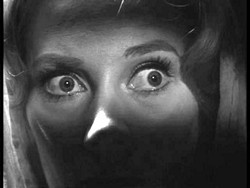The Fear Factor
 Last week I quoted from Lovecraft the following:
Last week I quoted from Lovecraft the following:
The oldest and strongest emotion of mankind is fear, and the oldest and strongest kind of fear is fear of the unknown.
The horror genre focuses on our fears, especially of the unknown, for entertainment value mostly.
Can Horror and Christianity Coexist?
Many people don’t believe that reading or writing horror is compatible with Christianity. To make the case, they will often quote Bible verses like the following:
For God hath not given us the spirit of fear; but of power, and of love, and of a sound mind. (2Ti 1:7 KJV)
And fear not them which kill the body, but are not able to kill the soul: but rather fear him which is able to destroy both soul and body in hell. (Mat 10:28 KJV)
For ye have not received the spirit of bondage again to fear; but ye have received the Spirit of adoption, whereby we cry, Abba, Father. (Rom 8:15 KJV)
There is no fear in love; but perfect love casteth out fear: because fear hath torment. He that feareth is not made perfect in love. (1Jn 4:18 KJV)
Out of context, these verses would seem to be speaking about fear as a whole. When you read them in context, they are speaking of specific fears. Obvious by the fact that if they weren’t, the Scriptures would be contradictory. One verse says to fear God, the next says such fear should be cast out.
For example, St. Paul’s words to St. Timothy in 2Ti 1:7 are in the context of encouraging the young leader to not fear, but be bold in his leadership. He was given a gift and ministry by God, and he should not fear to use it with authority. Paul is not speaking of fear as a whole, but fearing to fulfill the ministry God gave him.
Mat 10:28 above is in the context of fearing God instead of fearing what man might do or threaten. Fearing in this context relates to who you reverence with obedience. If it comes down to obeying man or God, Jesus is saying, fearing what God can do to you is the greater fear. Talk about the unknown: the second death! As if the first death isn’t scary enough.
Likewise, in Rom 8:15, St. Paul is speaking on the subject of following the flesh instead of the Spirit. The fear is breaking the Law through the flesh and becoming part of the damned. The fear of Judgment Day looms large. Such fear is not necessary when one is an adopted part of God’s family through grace. The verse merely points out that living by the flesh is fearful compared to living by grace.
St. John’s verse refers to what our motivation is to serve God. The Scriptures regularly say we should fear, reverence, God. St. Paul even tells the Philippians to, “work out your own salvation with fear and trembling.” (Phil 2:12b) The word fear is used 400 times in the King James Bible, and the majority of them are exhortations to fear God.
Obedience to God out of love is the better way, St. John says, but who among us has perfect love? He is not saying fear is sinful, just that it is not the best motivation for obedience. Not unless you are suggesting that St. John is contradicting everyone else before him.
These verses do not condemn fear itself. Indeed, there are more verses commanding us to fear God than God telling people to “fear not” upon addressing them. Even Jesus in His parables uses fear to guide people. For example, concluding the parable of the servant that owed a huge debt to his master, Jesus says:
So likewise shall my heavenly Father do also unto you, if ye from your hearts forgive not every one his brother their trespasses. (Mat 18:35 KJV)
God is not saying we should avoid fear, but face it and use it.
Horror can serve a Christian purpose. For while people read horror for the adrenalin rush, it goes deeper. For fear is a foundational emotion. To paraphrase Lovecraft, fear is the first and oldest emotion we experience.
This is in large part why babies just birthed cry. They are scared. And well they should be. They’ve just been violently ejected from their warm, safe womb, squeezed through a small hole, and into an alien, strange world. You’d be scared and cry too.
Then as we go through life, there are plenty of horrors we will face. Spankings. Nightmares. Being laughed at. Dating. Bullies. Cancer. Heart attacks. Diseases. Marriage. Infidelity. Divorce. Death. The list could go on and on.
How do we process and deal with our fears?
For many of them, it will be by facing those fears and realizing God will help you overcome them with His love and peace.
What better speculative genre to learn those lesson with than horror? A person can safely face their fear in a fictional context and learn that God can overcome them. If He can help us through those evils, He can give us courage to face our real-life horrors as well.
The fact is, evil is scary. But God is scarier.
To paraphrase Solomon, the beginning of wisdom is to be scared by God.
What other ways can the horror genre teach us the fear of the Lord?








































And that right there is also a problem, the deus ex machina factor. No tension if the audience is just expecting Jesus to blast the problems away or set up a glowy force field of character-prayer-powered protection.
And off-topic: Has anyone else heard of the movie Alone Yet Not Alone? Apparently it has ties to HSDLA and Vision Forum. It has an Oscar nomination for original song. And it’s also chock full of racism.
Also off-topic: Vision Forum is actually shut down now.
As a rule I’m a bit skeptical of charges of racism against Christians. Some are, but most are at best confused — and some are simply not as politically correct as we’d like. However, I’m open to further sources (again, off-topic; I can be emailed).
Welp, here’s the trailer: http://www.youtube.com/watch?v=3n0TORpISk8. Apparently they didn’t get any actual Native American actors (though I can’t see that any Native American actor would touch this with a ten-foot pole). Ergo, brownface. Booooo. Plus, there’s the whole “blonde, praying children are good, and the brown people are pagan and mean to them” thing.
And though I’m no expert, especially not on northeastern tribes, this looks like Hollywood Indians rather than an actual tribe, even though they name-drop the Delaware. No decoration on the clothes, generic-looking tattoos and paint, generic feather headdress junk. Lazy, in other words. Then again the “based on a true story” is one of the most useless phrases in the English language. I’m willing to bet the “true story” is half fiction or cobbled together from unrelated events.
While I’m sure one could find examples of deux ex machina in Christian horror where God is greater, giving that message doesn’t require a deux ex machina plot. Nor is this a temptation any greater than in other genres God plays a role.
Except, I will say that spiritual warfare stories may have more propensity to that than others. But, Christian horror doesn’t require a DEM.
Yeah. Just because God’s sovereign doesn’t mean that the story has to telegraph that reality. I can’t speak for anyone else, but I don’t feel that God’s sovereign a whole lot of the time in my own life. It’s something I’ll totally forget about if I’m not making a conscious effort to focus on what I know to be true. Because I don’t feel it to be true. Because it doesn’t seem true very often, at least not from my low-angle perspective.
If a story’s gonna sustain any kinda tension, it’s gotta feel like real life. It’s gotta feel unpredictable. And then — after all the natural, tumultuous emotions arising from fear and doubt and confusion have been thoroughly explored by our protags — just when the reader thinks that all is lost, just when no one can see a clear way forward, then the author’s finally in position to pull off that coveted unexpected-yet-inevitable resolution.
But it’ll only work if it’s unexpected.
It’s not so much that, as Christian horror has less flexibility in terms of situations.
One example is Mike Duran. In one of his books, he had a ghost in it. This is actually controversial, as many people don’t believe that ghosts as such can exist. “Once to die, and then the judgment,” as the verse goes, or instead a person is unconscious until they are raised at the last day. I think he got some flak over that.
There’s also cosmology. By this I mean whatever enemies or creatures you make have to be fit into a world where God exists as the Christian idea of Him. A lot of secular horror novels tend to be Manichean instead; they just make God the personification of a Good force, where Satan is the personification of an Evil one. But that’s not the case; Satan is an inferior being and is not God’s equal. And older gods simply don’t exist.
A lot of Christian horror has to tiptoe around things like this. I think it’s possible to work around it, but there are restrictions in what can be done.
I think valid restrictions would be simply one’s Christian worldview rather than another, like the Manichean one you mention. Yes, that does put some restrictions, as it does all our speculative stories. But it is also true that people put a lot of restrictions that don’t necessarily jive with Scripture.
Like those who say ghost are out, because they aren’t in the Bible. Look again. Both Samuel and Moses appear after death in seemingly non-corporeal form in Scripture. (1Sam 28:15, Matt 17:3)
Additionally, Jesus tells His own “ghost” story with the parable of the rich man and Lazarus. (Luk 16:19-31). Not to mention there appeared to be in Revelations plenty of bodiless souls active before Judgment Day. (Rev 6:9-11)
And that’s not even addressing the issue of the angels.
Rick, I was one of those who used to say Christian and horror were contradictory based on the purpose of horror. As I understood it, the goal was to frighten, pure and simple.
After a number of discussions with believers online, I’ve conceded that horror can show redemption–salvation from the truly horrible conditions of life which sin and its consequences have thrust upon humankind, from Satan and his minions, from whatever terrifies a soul.
I wouldn’t say God is scarier, but greater. I suppose, though, that’s a difference in perspective. God is to be revered, which is not the same as feared in the way a person might fear a rattlesnake. We should hold God in holy awe. We should fall at His feet in recognition of His sovereign authority and omnipotent reign.
All that said, there’s this verse in 1 Peter, 1 Peter 1:17, that still surprises me: “If you address as Father the One who impartially judges each according to his work, conduct yourselves in fear during the time of your stay on earth” (NASV). I haven’t take the time to look up “fear” in that verse to see if it means “reverence” or not. Either way, I don’t think this is a concept that is embraced by western Christians.
Becky
I would suggest that fearing the rattlesnake is very similar. Respect, awe, reverence, and fear go hand-in-hand. Example of that abound in Scripture, from Moses at the burning bush, Israel terrified to hear God speaking, the Paul suggesting that the Philippians work out their salvation with fear and trembling.
I don’t think a person could easily approach God without being scared, short of having that perfect love John talks about. But the reason God is scarier is because He is the most powerful being we can encounter. He alone has the power to send us into the second death, into Hell.
Even when Peter, James, and John see the glory of God fall upon Jesus on Mt. Tabor, along with Moses and Elijah, they fall on their faces out of fear. It is this reaction that causes angels and Jesus to often say “Fear not.” I.E., I’m not here to hurt you, but as a friend.
Note: fear is not the only reason one respects something, like one does a rattlesnake. Respect can also come from love, as John points out. That said, we have a lot of fears in this life. If fiction helps us deal with them, all the better.
I’d postulate that most good fiction is based on generating fear. The whole point of developing conflict is in fearing how the story might turn out. Facing a seemingly invincible enemy or situation. Without that fear of how badly something is going to go, you have no engaging story.
Horror simply uses certain monsters and atmosphere to generate that same tension. As Lovecraft said, it is the unknown we fear the most. That’s why so many people fear death, even a lot of Christians despite having good cause not to fear it.
C.S. Lewis had a good point about fear:
Horror can be used to overcome or deal with mundane fears, but his point was that certain types of fear bring us closer to what could be called the fear and awe of God. The uncanny as kind of a schoolmaster before the schoolmaster of the Law, to use an example. Many horror novels may not directly invoke the numinous, but by taking the uncanny and giving it a moral dimension they point us towards it.
That comment about the Numinious is surprisingly relevant to some of Charles Williams’ work, particularly Place of the Lion. Even after reading the book, I couldn’t say exactly what it’s about or what the sequence of events is, but the Numinious is most definitely present.
DM, that sort of sounds like what Lovecraft was getting at speaking of fear of the unknown.
The big difference, of course, is that while a ghost doesn’t present any danger, God can. For many, the Last Judgment will be the biggest horror one could ever experience.
It is a fearful thing to fall into the hands of the living God.
(Heb 10:31 KJV)
Yeah, Lovecraft’s Old Ones just have the fear without any of the good stuff about God.
You have the dread, and the reality-warping nature of both (We can’t look upon God as He is as human beings or we die.) But God cares about us, and He tempers the natural dread we feel. The uncanny becomes numinous when we realize its is good, and it cares for us. A good ghost is a wonderful and fearful thing.